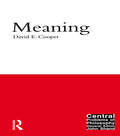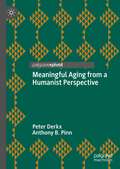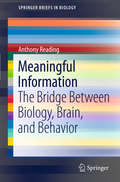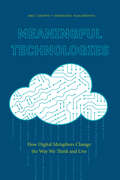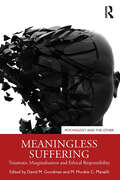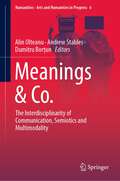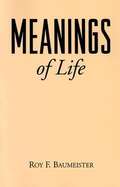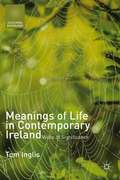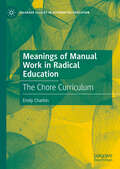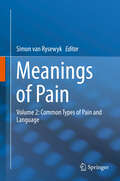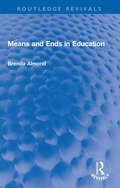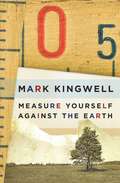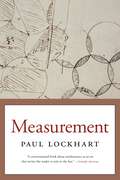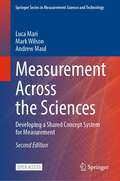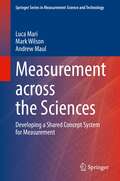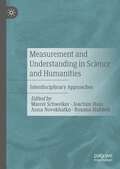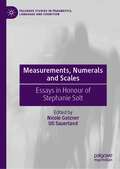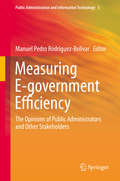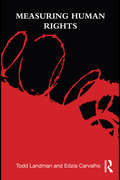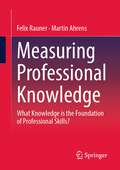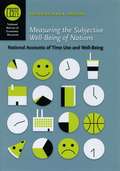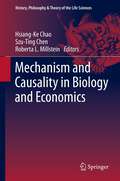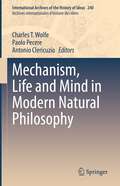- Table View
- List View
Meaning: Engaging With Nature And The Meaning Of Life (Central Problems Of Philosophy Ser. #9)
by David E. CooperMeaning is one of our most central and most ubiquitous concepts. Anything at all may, in suitable contexts, have meaning ascribed to it. In this wide-ranging book, David Cooper departs from the usual focus on linguistic meaning to discuss how works of art, ceremony, social action, bodily gesture, and the purpose of life can all be meaningful. He argues that the notion of meaning is best approached by considering what we accept as explanations of meaning in everyday practice and shows that in these situations we are explaining the appropriate fit of an item - whether a word or an artwork - with something larger than or outside of itself. This fuller account of meaning explores questions of the meaning of meaning and tackles issues such as whether meaning is just a misleading 'folk' term for something more basic, whether there really is meaning at all, and whether we should strive for meaning or let our lives 'just be' rather than mean. By taking the problem of meaning out of the technical philosophy of language and providing a more general account, Cooper is able to offer new insights into the import, function, and status of meaning that will be of interest not only to philosophers of language but to students and philosophers working in areas such as epistemology and metaphysics.
Meaningful Aging from a Humanist Perspective
by Anthony B. Pinn Peter DerkxAging is a topic of growing interest. As life expectancy in western societies is increasing, the growing number and proportion of ‘elderly’ persons raise urgent questions on how to age ‘well’. Predominantly, questions on aging are taken from biomedical and economic paradigms, which are intertwined. While people of age are seen as a cost in society, biomedical research aims at curing the declining effects of aging, thus furthering ideals of ‘healthy’ aging, ‘active’ aging, or ‘successful’ aging. In this book, Peter Derkx offers a comprehensive account of meaningful aging with Anthony Pinn responding in a fruitful and constructive way, for the benefit and edification of all of us.
Meaningful Information
by Anthony ReadingThe book introduces a radically new way of thinking about information and the important role it plays in living systems. It opens up new avenues for exploring how cells and organisms change and adapt, since the ability to detect and respond to meaningful information is the key that enables them to receive their genetic heritage, regulate their internal milieu, and respond to changes in their environment. It also provides a way of resolving Descartes' dilemma by explaining the workings of the brain in non-mechanical terms that are not tainted by spiritual or metaphysical beliefs. The types of meaningful information that different species and different cell types are able to detect are finely matched to the ecosystem in which they live, for natural selection has shaped what they need to know to function effectively in those circumstances. Biological detection and response systems range from the chemical configurations that govern genes and cell life to the relatively simple tropisms that guide single-cell organisms, the rudimentary nervous systems of invertebrates, and the complex neuronal structures of mammals and primates. The scope of meaningful information that can be detected and responded to reaches its peak in our own species, as exemplified by our special abilities in language, cognition, emotion, and consciousness, all of which are explored within this new framework.
Meaningful Technologies: How Digital Metaphors Change the Way We Think and Live
by Eric Chown Fernando NascimentoAs smartphones mediate more of our activities, they are changing our relationship with meaning. To a teenager, for example a “conversation” is just as likely to refer to an exchange of text messages as it is a face-to-face discussion. Meanwhile, Facebook has redefined what friendship means, Snapchat what a memory means, etc. The kinds of changes smartphones bring are happening at rapid pace: TikTok reached a billion users in just over three years, whereas it took the telephone 75 years to reach a tenth of that number of people. Meaningful Technologies: How Digital Metaphors Change the Way We Think and Live by Eric Chown and Fernando Nascimento offers systematic reconsideration of the ways in which digital technologies impact our lives both individually and collectively. Metaphors aren’t just a clever way to describe technology, they are also changing the way we think. When we click on a picture of a shopping cart it connects a complex set of technologies to represent a simple idea that we’re all familiar with. A heart icon under a photo is understood as an easy way to express appreciation. We aren’t required to understand how technology works, just how we interact with it. The ambiguity of metaphors, and the complexity of technology can also hide important realities about what is being described. “The cloud,” for example, actually consists of very real data centers, which consume huge amounts of natural resources to keep running. Meanwhile, pressing that heart icon on a photo is a signal to the artificial intelligences running in your app that you want to see more things like that photo and that it should adjust what it knows about you accordingly. There is a constant feedback loop between us and the digital technologies we use. We are constantly using them and they are changing us through their usage. Meaningful Technologies focuses on this loop from the perspectives of hermeneutic philosophy and cognitive science. Through the former, the authors examine meaning and how it changes over time. Through the latter, they gain understanding of how this feedback loop impacts individuals, especially in terms of learning and attention. Chown and Nascimento argue that, on the one hand, apps have a kind of agency never before possible in a technology, but also that, armed with a critical framework for examining such apps, we can regain some of our own agency. This book will appeal to scholars of digital media digital and computational studies, and those interested in issues related to ethical impacts of digital technologies.
Meaningless Suffering: Traumatic Marginalisation and Ethical Responsibility (Psychology and the Other)
by David M. Goodman M. Mookie C. ManaliliDoes suffering have meaning? The leading scholars and practitioners in Meaningless Suffering engage with this haunting human question through the lenses of psychoanalytic, phenomenological and ethical discourse, all the while holding contemporary social concerns in full view. The authors seek to find ways of speaking about the lived realities and historical moments that make up our social narratives – from the murder of George Floyd to the bird watching incident in Central Park – in order to render visible the entangled forms of the effects of embodiment, ideology, race, social practice, and intersectionality. Meaningless Suffering is bookended by powerful pieces by Mari Ruti and Homi K. Bhabha and, in the intervening chapters, the reader traverses the ideas of Augustine, Judith Butler, Fanon, Foucault, Freud, Gendlin, Heidegger, Lacan, Levinas, and Wittgenstein to pass through the realms of classical thought, affect theory, phenomenology, linguistic studies, relational psychoanalysis, somatic studies, intersubjectivity theory, gender studies, critical theory, and philosophical hermeneutics. This book is essential reading for postgraduate students, scholars, and practitioners working at the intersection of psychoanalysis, race, politics, and culture, as well as students of cultural studies, the humanities, politics, psychology, psychosocial studies, sociology, and social work.
Meanings & Co.: The Interdisciplinarity of Communication, Semiotics and Multimodality (Numanities - Arts and Humanities in Progress #6)
by Alin Olteanu Andrew Stables Dumitru BorţunThis book explores the interdisciplinarity of semiotics and communication studies, comprising both theoretical explorations and semiotic applications to communication with theoretical bearings. These disciplines have generally been understood as mutually implicit, but there still are many unexplored research avenues in this area, particularly on a conceptual level. The book offers broad insights into the epistemological relations between semiotics and other approaches to communication from perspectives such as sociology, philosophy of language and communication theory. As such, it sheds light on the communication of knowledge.Semiotics is currently enjoying increasing popularity within the humanities and social sciences. Understood as relational logic (Charles Peirce) or hermeneutics (structuralism and poststructuralism), semiotics fundamentally implies certain positions with regard to communication. Because of the generality and conceptual vagueness of semiosis and communication, how one elucidates the other is still an underexplored theme. With some pioneering studies of this relation, the books examines various fields, such as language, code, learning, embodiment, political communication, media, cinema, cuisine, multimodality and intertextuality.
Meanings Of Life
by Roy F. BaumeisterIn this extraordinary book, an eminent social scientist explores what empirical studies from diverse fields tell us about the human condition. Meanings of Life draws together evidence from psychology, history, anthropology, and sociology, integrating copious research findings into a clear and conclusive discussion of how people attempt to make sense of their lives. In a lively and accessible style, emphasising facts over theories, Baumeister explores why people desire meaning in their lives, how these meanings function, what forms they take, and what happens when life loses meaning. The volume includes a review of interdisciplinary literature that covers what the social sciences say about such matters as happiness, suffering, and death. It explores people's need for a sense of purpose, values, control over their lives, and a sense of self worth. Divorce and religious conversion are also examined. The book attempts to analyze the myths of fulfilment and higher meaning, illusions of eternity, the suppression of female sexuality, the failure of the work ethic, why death is more threatening to us than it was to our ancestors, and how suffering stimulates the quest for meaning. It demonstrates how happiness depends more upon one's interpretation than actual circumstances, and shows that the keys to happiness are attitude, judicious comparison, a bit of luck and a healthy dose of self-deception.
Meanings Of Life In Contemporary Ireland
by Tom InglisThe struggle to create and sustain meaning in our everyday lives is fought using cultural ingredients to spin the webs of meaning that keep us going. To help reveal the complexity and intricacy of the webs of meaning in which they are suspended, Tom Inglis interviewed one-hundred people in their native home of Ireland to discover what was most important and meaningful for them in their lives. Inglis believes language is a medium: there is never an exact correspondence between what is said and what is felt and understood. Using a variety of theoretical lenses developed within sociology and anthropology, Inglis places their lives within the context of Ireland's social and cultural transformations, and of longer-term processes of change such as increased globalisation, individualisation, and informalisation.
Meanings of Manual Work in Radical Education: The Chore Curriculum (Palgrave Studies in Alternative Education)
by Emily CharkinThis book aims to challenge and inspire readers with lived examples of alternatives to current paradigms in education, childhood and community, through new research into two important and neglected schools in the history of progressive and radical education. Kilguhanity and Wennington schools were both founded in the UK in 1940, and at both schools pupils and staff were extensively involved in the manual work of looking after and shaping the physical fabric of the community. The author uses these case studies to challenge the tendency to equate pupil participation with ‘voice’ and ‘meetings’, and casts light on a fault line within the progressive and radical traditions. She then presents new challenges and perspectives to ongoing debates about education and childhood, unsettling the stalemate between liberal and traditional, and progressive and radical schools by uncovering a community-based alternative. The book offers a contribution to a growing body of contemporary research literature on progressive and radical education, alternative education, informal education and social pedagogy as well as across the disciplines of childhood studies, history, philosophy and geography.
Meanings of Pain: Volume 2: Common Types of Pain and Language
by Simon Van RysewykExperiential evidence shows that pain is associated with common meanings. These include a meaning of threat or danger, which is experienced as immediately distressing or unpleasant; cognitive meanings, which are focused on the long-term consequences of having chronic pain; and existential meanings such as hopelessness, which are more about the person with chronic pain than the pain itself. This interdisciplinary book - the second in the three-volume Meanings of Pain series edited by Dr Simon van Rysewyk - aims to better understand pain by describing experiences of pain and the meanings these experiences hold for the people living through them. The lived experiences of pain described here involve various types of chronic pain, including spinal pain, labour pain, rheumatic pain, diabetic peripheral neuropathic pain, fibromyalgia, complex regional pain syndrome, endometriosis-associated pain, and cancer-related pain. Two chapters provide narrative descriptions of pain, recounted and interpreted by people with pain.Language is important to understanding the meaning of pain since it is the primary tool human beings use to manipulate meaning. As discussed in the book, linguistic meaning may hold clues to understanding some pain-related experiences, including the stigmatisation of people with pain, the dynamics of patient-clinician communication, and other issues, such as relationships between pain, public policy and the law, and attempts to develop a taxonomy of pain that is meaningful for patients. Clinical implications are described in each chapter.This book is intended for people with pain, their family members or caregivers, clinicians, researchers, advocates, and policy makers.“It is my opinion that this ... work will stand as the definitive reference work in this field. I believe it will enrich the professional and personal lives of health care providers, researchers and people who have persistent pain and their family members. The combination of framework chapters with chapters devoted to analysing the lived experience of pain conditions gives the requisite breadth and depth to the subject.” - Dr Marc A. Russo, MBBS DA(UK) FANZCA FFPMANZCA, Newcastle, Australia, from the Foreword
Means Without End: Notes on Politics (Theory Out of Bounds #20)
by Giorgio AgambenAn essential reevaluation of the proper role of politics in contemporary life. In this critical rethinking of the categories of politics within a new sociopolitical and historical context, the distinguished political philosopher Giorgio Agamben builds on his previous work to address the status and nature of politics itself. Bringing politics face-to-face with its own failures of consciousness and consequence, Agamben frames his analysis in terms of clear contemporary relevance. He proposes, in his characteristically allusive and intriguing way, a politics of gesture—a politics of means without end.Among the topics Agamben takes up are the "properly" political paradigms of experience, as well as those generally not viewed as political. He begins by elaborating work on biopower begun by Foucault, returning the natural life of humans to the center of the polis and considering it as the very basis for politics. He then considers subjects such as the state of exception (the temporary suspension of the juridical order); the concentration camp (a zone of indifference between public and private and, at the same time, the secret matrix of the political space in which we live); the refugee, who, breaking the bond between the human and the citizen, moves from marginal status to the center of the crisis of the modern nation-state; and the sphere of pure means or gestures (those gestures that, remaining nothing more than means, liberate themselves from any relation to ends) as the proper sphere of politics. Attentive to the urgent demands of the political moment, as well as to the bankruptcy of political discourse, Agamben’s work brings politics back to life, and life back to politics.Giorgio Agamben teaches philosophy at the Collège International de Philosophie in Paris and at the University of Macerata in Italy. He is the author of Language and Death (1991), Stanzas (1992), and The Coming Community (1993), all published by the University of Minnesota Press.
Means and Ends in Education (Routledge Revivals)
by Brenda AlmondFirst published in 1982, Means and Ends in Education explores the contrasts between approaches to teaching where teaching is simply a means to some other end; approaches in which the end determines the means; and approaches in which means and ends are integrated and education serves an intrinsic purpose. The book considers the concept of education and evaluates different processes and techniques of teaching and learning. Divided into three parts, it covers instrumentalist approaches, learner-oriented approaches, and liberal approaches to education. It puts forward differing views as to what the term ‘education’ means to different professions and in different contexts, and how different approaches result in a very different experience for the recipient. It also discusses the extent to which an evaluation of methods of education and an evaluation of the aims of education are linked. Means and Ends in Education will appeal to those with an interest in the philosophy of education.
Measure Yourself Against the Earth
by Mark KingwellMark Kingwell is the rare philosopher who is as at home discussing Sex and the City as he is civility, who can find the Plato in pop culture, and sees in idleness a deeply revolutionary gesture. In Democracy's Gift, he brings his heady mixture of critical intelligence and infectious enthusiasm to bear on film, aesthetics, politics, and more, and confirms his place as one of our leading cultural theorists and philosophers.After some years of graduate education in Britain and the United States, Mark Kingwell found a form of idling for which he could get paid as a professor of philosophy at the University of Toronto.
Measurement
by Paul LockhartPaul Lockhart’s Mathematician’s Lament outlined how we introduce math to students in the wrong way. Measurement explains how math should be done. With plain English and pictures, Lockhart makes complex ideas about shape and motion intuitive and graspable, and offers a solution to math phobia by introducing us to math as an artful way of thinking and living.In conversational prose that conveys his passion for the subject, Lockhart makes mathematics accessible without oversimplifying. He makes no more attempt to hide the challenge of mathematics than he does to shield us from its beautiful intensity. Favoring plain English and pictures over jargon and formulas, he succeeds in making complex ideas about the mathematics of shape and motion intuitive and graspable. His elegant discussion of mathematical reasoning and themes in classical geometry offers proof of his conviction that mathematics illuminates art as much as science.Lockhart leads us into a universe where beautiful designs and patterns float through our minds and do surprising, miraculous things. As we turn our thoughts to symmetry, circles, cylinders, and cones, we begin to see that almost anyone can “do the math” in a way that brings emotional and aesthetic rewards. Measurement is an invitation to summon curiosity, courage, and creativity in order to experience firsthand the playful excitement of mathematical work.
Measurement Across the Sciences: Developing a Shared Concept System for Measurement (Springer Series in Measurement Science and Technology)
by Mark Wilson Luca Mari Andrew MaulThis open access book proposes a conceptual framework for understanding measurement across a broad range of scientific fields and areas of application, such as physics, engineering, education, and psychology. It addresses contemporary issues and controversies within measurement in light of the framework, including operationalism, definitional uncertainty, and the relations between measurement and computation, and describes how the framework, operating as a shared concept system, supports understanding measurement’s work in different domains, using examples in the physical and human sciences.This revised and expanded second edition features a new analysis of the analogies and the differences between the error/uncertainty-related approach adopted in physical measurement and the validity-related approach adopted in psychosocial measurement. In addition, it provides a better analysis and presentation of measurement scales, in particular about their relations with quantity units, and introduces the measurand identification/definition as a part of the "Hexagon Framework" along with new examples from the physical and psychosocial sciences. Researchers and academics across a wide range of disciplines including biological, physical, social, and behavioral scientists, as well as specialists in measurement and philosophy appreciate the work’s fresh and provocative approach to the field at a time when sound measurements of complex scientific systems are increasingly essential to solving critical global problems.
Measurement across the Sciences: Developing a Shared Concept System for Measurement (Springer Series in Measurement Science and Technology)
by Mark Wilson Luca Mari Andrew MaulThis book proposes a conceptual framework for understanding measurement across a broad range of scientific fields and areas of application, such as physics, engineering, education, and psychology. The authors, who themselves span these disciplines, argue that the justification of the public trust attributed to measurement results can in principle apply identically to both physical and psychosocial properties. They further argue that the lack of a common conceptualization of measurement hampers interdisciplinary communication and limits the ability to share knowledge. They advance their views by first surveying the conceptual history of the philosophy of measurement and arguing that classical, operationalist and representational perspectives on measurement each make important contributions but also each have important shortcomings. A synthesis is then offered as the foundation for a new conceptual framework. The authors describe how the framework, which operates as a shared concept system, supports understanding measurement’s work in different domains, using examples in the physical and human sciences. They consider connections and consequences with respect to causality, objectivity, and intersubjectivity, among other topics, and how measurement science concepts and issues are construed across these disciplines and settings. They also address contemporary issues and controversies within measurement in the light of the framework, including operationalism, definitional uncertainty, and the relations between measurement and computation. The book concludes with a justification for the basic claim that measurement is an empirical and informational process that produces explicitly justifiable information. Researchers and academics across a wide range of disciplines including biological, physical, social and behavioral scientists, as well as specialists in measurement and philosophy will appreciate the work’s fresh and provocative approach to the field at a time when sound measurements of complex scientific systems are increasingly essential to solving critical global problems.
Measurement and Understanding in Science and Humanities: Interdisciplinary Approaches
by Marcel Schweiker Joachim Hass Anna Novokhatko Roxana HalbleibThis anthology is a unique compilation of scientific contributions on the topic of measurement and understanding, showing how terms such as number, measurement, understanding, model, pattern are used in a wide variety of disciplines. Based on the results and experiences from their own projects, 23 researchers comment on the potentials and limitations of individual methodological approaches and success factors of interdisciplinary collaboration. In doing so, they sound out the different significance of quantification and empirical evidence for their own disciplines and examine the influence of methodological approaches on existing models and images. The common goal is to want to understand the world; the methods, however, are highly diverse.
Measurements, Numerals and Scales: Essays in Honour of Stephanie Solt (Palgrave Studies in Pragmatics, Language and Cognition)
by Nicole Gotzner Uli SauerlandThis book brings together chapters on the semantics and pragmatics of measurement, scales, and numerical expressions. The chapters highlight recent developments in measurement theory, the meaning of numerical expressions and the relation between measurement scales and entailment scales. The authors provide explorations in formal and experimental semantics and pragmatics, as well as at the interfaces of this field with others including philosophy of language and sociolinguistics. This book will be of interest to students and scholars in these areas, as well as psychology, psycholinguistics and artificial intelligence.
Measuring E-government Efficiency
by Manuel Pedro Rodríguez-BolívarE-government has the potential to improve public services, information transparency, and the engagement of civic participation of the public sector management. This book analyzes the achievement of expectations created by public managers, policy-makers, and stakeholders with regard to the implementation of e-government policies and applications. It also tries to determine whether e-government applications have been introduced as a fad or according to real demands from citizenry and if efforts within e-government have been effective. This book investigates how public managers and policy-makers imagine e-government policies and the impact of those policies on their management and decision-making process through the engagement of citizenry. It is also discusses whether e-government policies are merely procedural improvements that strictly introduce new ways of delivering public services or disclosing public sector information. The book's analysis of the overall expectations on e-government applications makes it of interest to scholars in public administration as well as to policy-makers and stakeholders.
Measuring Human Rights
by Todd Landman Edzia CarvalhoThe measurement of human rights has long been debated within the various academic disciplines that focus on human rights, as well as within the larger international community of practitioners working in the field of human rights. Written by leading experts in the field, this is the most up-to-date and comprehensive book on how to measure human rights. Measuring Human Rights: draws explicitly on the international law of human rights to derive the content of human rights that ought to be measured contains a comprehensive methodological framework for operationalizing this human rights content into human rights measures includes separate chapters on the methods, strengths and biases of different human rights measures, including events-based, standards-based, survey-based, and socio-economic and administrative statistics covers measures of civil, political, economic, social and cultural rights includes a complete bibliography, as well as sources and locations for data sets useful for the measurement of human rights. This volume offers a significant and timely addition to this important area of work in the field of human rights, and will be of interest to academics and NGOs, INGOs, international governmental organizations, international financial institutions, and national governments themselves.
Measuring Professional Knowledge: What Knowledge is the Foundation of Professional Skills?
by Felix Rauner Martin AhrensIn this book, we show the replacement of academic and vocational education, which is structured according to subject systems and oriented towards scientific knowledge, by vocational action knowledge. This work process knowledge is the basis for the acquisition of the design competence of vocational specialists, which is becoming increasingly important in the world of work.A modern knowledge concept based on vocational education is developed and documented. In the first part of the book the concept of vocational knowledge is developed, in the second part empirical results from COMET projects are documented, from which the vocational knowledge imparted in different occupations can be read.There has been a confusing discussion about vocational knowledge for decades. In 1991, the KMK agreed on a new concept for vocational education and training with the guiding idea of vocational design competence. It remained open on which vocational knowledge this new guiding idea should be based. Up to now there has been no original vocational pedagogical justification for the vocational knowledge on which vocational design competence is based.
Measuring the Mosaic
by Rick Helmes-HayesMeasuring the Mosaic is a comprehensive intellectual biography of John Porter (1921-1979), author of The Vertical Mosaic (1965), preeminent Canadian sociologist of his time, and one of Canada's most celebrated scholars. In the first biography of this important figure, Rick Helmes-Hayes provides a detailed account of Porter's life and an in-depth assessment of his extensive writings on class, power, educational opportunity, social mobility, and democracy.While assessing Porter's place in the historical development of Canadian social science, Helmes-Hayes also examines the economic, social, political and scholarly circumstances - including the Depression, World War II, post-war reconstruction, the baby boom, and the growth of universities - that contoured Porter's political and academic views. Using extensive archival research, correspondence, and over fifty original interviews with family, colleagues, and friends, Measuring the Mosaic stresses Porter's remarkable contributions as a scholar, academic statesman, senior administrator at Carleton University, and engaged, practical public intellectual.
Measuring the Subjective Well-being of Nations: National Accounts of Time Use and Well-being
by Alan B. KruegerSurely everyone wants to know the source of happiness, and indeed, economists and social scientists are increasingly interested in the study and effects of subjective well-being. Putting forward a rigorous method and new data for measuring, comparing, and analyzing the relationship between well-being and the way people spend their time-across countries, demographic groups, and history-this book will help set the agenda of research and policy for decades to come. It does so by introducing a system of National Time Accounting (NTA), which relies on individuals' own evaluations of their emotional experiences during various uses of time, a distinct departure from subjective measures such as life satisfaction and objective measures such as the Gross Domestic Product. A distinguished group of contributors here summarize the NTA method, provide illustrative findings about well-being based on NTA, and subject the approach to a rigorous conceptual and methodological critique that advances the field. As subjective well-being is topical in economics, psychology, and other social sciences, this book should have cross-disciplinary appeal.
Mechanism and Causality in Biology and Economics
by Szu-Ting Chen Hsiang-Ke Chao Roberta L. MillsteinThis volume addresses fundamental issues in the philosophy of science in the context of two most intriguing fields: biology and economics. Written by authorities and experts in the philosophy of biology and economics, Mechanism and Causality in Biology and Economics provides a structured study of the concepts of mechanism and causality in these disciplines and draws careful juxtapositions between philosophical apparatus and scientific practice. By exploring the issues that are most salient to the contemporary philosophies of biology and economics and by presenting comparative analyses, the book serves as a platform not only for gaining mutual understanding between scientists and philosophers of the life sciences and those of the social sciences, but also for sharing interdisciplinary research that combines both philosophical concepts in both fields. The book begins by defining the concepts of mechanism and causality in biology and economics, respectively. The second and third parts investigate philosophical perspectives of various causal and mechanistic issues in scientific practice in the two fields. These two sections include chapters on causal issues in the theory of evolution; experiments and scientific discovery; representation of causal relations and mechanism by models in economics. The concluding section presents interdisciplinary studies of various topics concerning extrapolation of life sciences and social sciences, including chapters on the philosophical investigation of conjoining biological and economic analyses with, respectively, demography, medicine and sociology.
Mechanism, Life and Mind in Modern Natural Philosophy (International Archives of the History of Ideas Archives internationales d'histoire des idées #240)
by Charles T. Wolfe Paolo Pecere Antonio ClericuzioThis volume emphasizes the diversity and fruitfulness of early modern mechanism as a program, as a concept, as a model. Mechanistic study of the living body but also of the mind and mental processes are examined in careful historical focus, dealing with figures ranging from the first-rank (Bacon, Descartes, Spinoza, Cudworth, Gassendi, Locke, Leibniz, Kant) to less well-known individuals (Scaliger, Martini) or prominent natural philosophers who have been neglected in recent years (Willis, Steno, etc.). The volume moves from early modern medicine and physiology to late Enlightenment and even early 19th-century psychology, always maintaining a conceptual focus. It is a contribution to a newly active field in the history and philosophy of early modern life science. It is of interest to scholars studying the history of medicine and the development of mechanistic theories.
